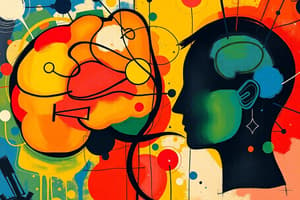Podcast
Questions and Answers
What is the main purpose of the referential function of language?
What is the main purpose of the referential function of language?
- To ensure communication is effective
- To inform about reality and its related elements (correct)
- To express the emotions of the speaker
- To elicit a response from the listener
Which function of language is primarily concerned with the aesthetic form of the message?
Which function of language is primarily concerned with the aesthetic form of the message?
- Metalinguistic Function
- Appellative/Conative Function
- Emotiva/Expressive Function
- Poetic Function (correct)
What role does the phatic function of language serve in communication?
What role does the phatic function of language serve in communication?
- To express the speaker’s feelings accurately
- To prompt the receiver to act
- To define terms and classify language usage
- To check if the communication channel is functioning (correct)
In which function does the speaker aim to provoke a reaction or response from the receiver?
In which function does the speaker aim to provoke a reaction or response from the receiver?
Which function of language involves using language to talk about language itself?
Which function of language involves using language to talk about language itself?
What does the term 'logos' refer to in the context of logic?
What does the term 'logos' refer to in the context of logic?
Who is considered the father of logic?
Who is considered the father of logic?
What is the primary aim of logic in scientific research?
What is the primary aim of logic in scientific research?
Which of the following best describes a nominal definition in the context of logic?
Which of the following best describes a nominal definition in the context of logic?
What is a key factor of thinking as described in the elements of thought?
What is a key factor of thinking as described in the elements of thought?
What distinguishes a concept from a word?
What distinguishes a concept from a word?
Which statement accurately describes judgment?
Which statement accurately describes judgment?
What constitutes a concept?
What constitutes a concept?
What are essential characteristics in relation to a concept?
What are essential characteristics in relation to a concept?
How is a term comparable to a concept?
How is a term comparable to a concept?
What represents the conclusion of a deductive argument?
What represents the conclusion of a deductive argument?
Which of the following illustrates inductive reasoning?
Which of the following illustrates inductive reasoning?
What is the main factor that determines the validity of a deductive argument?
What is the main factor that determines the validity of a deductive argument?
What might cause an inductive conclusion to be considered weak?
What might cause an inductive conclusion to be considered weak?
Which of the following best describes syllogism in deductive logic?
Which of the following best describes syllogism in deductive logic?
Which function of language primarily deals with truth and falsity?
Which function of language primarily deals with truth and falsity?
What is one characteristic of logic when considered as science?
What is one characteristic of logic when considered as science?
How does Socrates utilize logic?
How does Socrates utilize logic?
What principle characterizes logic as an art?
What principle characterizes logic as an art?
Which function of language is primarily persuasive and subjective?
Which function of language is primarily persuasive and subjective?
What defines the relationship between a concept's comprehension and its extension?
What defines the relationship between a concept's comprehension and its extension?
What type of reasoning starts with specific observations to form a general conclusion?
What type of reasoning starts with specific observations to form a general conclusion?
Which of the following best describes a judgment?
Which of the following best describes a judgment?
What distinguishes abstract concepts from concrete concepts?
What distinguishes abstract concepts from concrete concepts?
Which statement illustrates deductive reasoning?
Which statement illustrates deductive reasoning?
What are the components of a syllogism in deductive logic?
What are the components of a syllogism in deductive logic?
Which statement accurately reflects inductive logic?
Which statement accurately reflects inductive logic?
In the rooster example provided, what is the main flaw in the inductive reasoning?
In the rooster example provided, what is the main flaw in the inductive reasoning?
What can be concluded from deductive logic if both premises are true?
What can be concluded from deductive logic if both premises are true?
Which of the following best describes the nature of inductive reasoning?
Which of the following best describes the nature of inductive reasoning?
Which of the following best describes the concept of 'thought'?
Which of the following best describes the concept of 'thought'?
What is the role of the 'Emisor' in the communication model?
What is the role of the 'Emisor' in the communication model?
Which function of language is focused on evoking an emotional response?
Which function of language is focused on evoking an emotional response?
In the communication model, the 'Código' refers to what aspect?
In the communication model, the 'Código' refers to what aspect?
What is the 'Canal' in the language communication model?
What is the 'Canal' in the language communication model?
Which statement best defines logic?
Which statement best defines logic?
What is one of the benefits of logic in everyday life?
What is one of the benefits of logic in everyday life?
How does logic contribute to scientific understanding?
How does logic contribute to scientific understanding?
Which of the following is NOT a benefit of logic?
Which of the following is NOT a benefit of logic?
What role does logic play in problem solving?
What role does logic play in problem solving?
What does the term 'Factica' primarily involve?
What does the term 'Factica' primarily involve?
Which of the following best describes the type of reasoning used in 'Theorical' studies?
Which of the following best describes the type of reasoning used in 'Theorical' studies?
What category does a pandemic fall under according to the given content?
What category does a pandemic fall under according to the given content?
Which of the following is categorized as socio-factual?
Which of the following is categorized as socio-factual?
How is the human origin described in the notes?
How is the human origin described in the notes?
Flashcards are hidden until you start studying
Study Notes
Inductive and Deductive Logic
- Deductive Logic:
- Moves from general principles to specific conclusions.
- Uses syllogisms, a three-part argument with two premises and a conclusion.
- Premise 1: All men are mortal.
- Premise 2: Socrates is a man.
- Conclusion: Socrates is mortal.
- Inductive Logic:
- Moves from specific observations to general conclusions.
- Relies on examples and observations to infer probabilities.
- Premise 1: Luis smokes and has heart problems.
- Premise 2: Maria Puma smokes and has cancer.
- Premise 3: Roman Fumed and had health issues.
- Conclusion: All smokers have health problems. (Note: This conclusion is based on limited observations and may not be universally true).
- Validity:
- The validity of a deductive argument depends on its structure, not the content of the premises.
- The strength of an inductive argument depends on whether the provided examples/observations represent typical cases.
Functions of Language and Communication Elements
- Referential Function: Informs about reality and its related elements within the context.
- Emotiva/Expressive Function: Expresses feelings, emotions, or moods of the speaker. The speaker is the related element.
- Appellative/Conative Function: Aims to elicit a reaction from the receiver (e.g., commands, questions). The receiver is the related element..
- Phatic Function: Checks if the communication channel is working correctly. The channel is the related element.
- Poetic Function: Focuses on the aesthetic form of the message. The message is the related element.
- Metalinguistic Function: Using language to talk about language itself (defining terms, classifying). The language code being used is the related element.
Logic as Science & Art
- Logic as Science:
- Used to verify the validity of reasoning.
- Systematizes principles and methods to separate valid from invalid statements.
- Establishes principles and truths, giving it a scientific character.
- Logic as Art:
- Used to prepare for oral defenses, reaching truth through dialogue.
- Organizing discussions and debates.
- Building and evaluating arguments from oneself and others.
- Accepting the consequences of one's statements.
Concepts, Judgments, and Reasoning
- Concepts:
- Mental or intellectual representations of the essential characteristics of an object, without affirming or denying those characteristics.
- Comprehension (intensity) and extension (scope) of concepts are inversely related.
- Judgments:
- Critical assessments or evaluations that affirm or deny something about reality.
- Reasoning:
- Drawing conclusions from judgments.
- Inductive Reasoning: Starts with particular observations and moves towards a general conclusion.
- Deductive Reasoning: Starts with a general statement and moves towards a specific conclusion.
Notes on Language
-
Subject (pensante): Being that reflects consciously on the environment.
-
Act of thinking: Mental process - Ideas.
-
Thought: Representation of reality.
-
Object: Observed or thought of fact.
-
Expressing language: Functions.
-
Logic: Structure of thought.
-
Inquiry:
-
Language Functions:
- Six functions: Referential, emotional, appellative, aesthetic, metalinguistic, and direct.
-
Model of Communication:
- Emisor (Sender): Provides the message.
- Receptor (Receiver): Receives the message.
- Lenguaje (Language): The medium for conveying the message.
- Código (Code): System of signs to transmit message.
- Canal (Channel): Medium for transmission (e.g., air).
- Medio Físico (Physical medium): The actual physical means of transmission.
- Entidad Viva (Living Entity): The living being involved in the communication.
Logic
- Logic is the art of reasoning, the part of science that teaches a method to reach truth.
- Logic is the science of the necessary laws of understanding and reason.
- Logic is the science of the pure idea, the abstract element of thought.
- Logic is the science that studies the correction of reasoning, both formal and informal.
Benefits of Logic in Science and Everyday Life
- Improved Thinking: It helps the mind think with connection, order, depth, and coherence.
- Scientific Basis: It builds up a scientific groundwork for investigations.
- Better Decisions: It leads to better decision-making, improving intellectual and moral capabilities.
- Critical Thinking: It aids in the identification and generation of critical thinking.
- Mental Sharpness: It increases mental acuity.
- Methodological Approach: It helps to create a methodology for daily life.
- Problem Solving: It fortifies defenses and helps solve problems, especially legal and other issues.
- Scientific Understanding: It improves scientific comprehension.
Notes
- Factica (Science): Studies facts based on observation and experimentation.
- Theorical (Science): Based on logic, or mathematics (to create hypotheses).
- Universe creation: Theoretical natural - based on reflection or observation.
- Factica - if it's about birth.
- A pandemic: Socio-natural.
- Country's pyramids: Socio-factual.
- Illiteracy: Social theories.
Studying That Suits You
Use AI to generate personalized quizzes and flashcards to suit your learning preferences.




